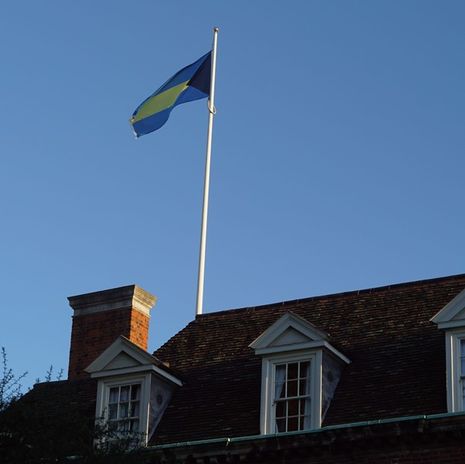Cambridge celebrates Black History Month
Colleges across the University have put on events in celebration of Cambridge’s Black history

Black History Month (BHM) celebrations, which are held every October across the UK, are now underway in Cambridge.
Eight Cambridge colleges - Newnham, Trinity, St Catharine’s, Lucy Cavendish, Murray Edwards, Churchill, Wolfson, and Hughes Hall - have detailed their plans for BHM to Varsity.
Newnham College has commissioned Barbadian-British documentary photographer Myah Jeffers to create portraits of black students to mark BHM. These will be exhibited in the College’s Iris Café until July 2022 as part of the College’s 150th anniversary celebrations.
In a college press release, third-year student and former JCR BAME Officer Oluchi Ugochukwu said: “Being a Black student at Cambridge can still often feel ground-breaking to those outside of the University and so the aim is to challenge possible inaccurate preconceptions of what a successful, scholarly student looks like today.
“At present there are very few portraits of students or of Black individuals on display in College. We wanted to explore Newnham’s history, our present, and how Newnham could look in the future.
“In the wake of the Black Lives Matter movement, students and staff have been collaborating to better support people of colour at Newnham, and it has been even more important that Black students feel connected and cohesive as a community. This project will help us better represent and celebrate the values and true diversity of the College in its anniversary year, to make visible, to celebrate and to take up space.”

Jeffers said: “I was honoured to be given the opportunity to photograph a number of Black students as part of Newnham College’s 150th-anniversary celebrations. My starting point was interrogating the composed nature of traditional academic portraiture and then subverting that in a way which felt true to the contemporary nature of the project and of highlighting the individual.”
She continued: “For me, the idea of having these portraits exhibited in such a space felt really radical – moving from traditional portraiture’s celebration of achievement over actual existence. Visually, the portraits are simple and somewhat formal in their composition – but it’s a project which represents so much and its momentous nature gives each portrait gravitas.”
Trinity College has also invited photographer Henry Kamara to work on a project that will build on last year’s ‘Succession’ exhibition, which featured 11 portraits of Black Trinity students. Kamara’s work will be exhibited at the College from 25 October through to 12 November.
Meanwhile, a number of colleges are flying flags during BHM. Churchill College is among those flying the Pan-African flag throughout October, while St Catharine’s College will fly the Bahamian flag at full mast on the 1st and 31st of October to commemorate the College’s earliest known Black student, Alfred F. Adderley CBE (1891-1953).
Research conducted by the College in 2020 found that Adderley arrived in Cambridge in 1912 to study Law, after which he returned to the Bahamas and became a leading lawyer, politician, and sportsman. St Catharine’s first flew the Bahamian flag in his honour during last year’s BHM celebrations.
The Churchill Archives Centre is commemorating another notable Black alumnus of the University, Dr Davidson Nicol, in an online exhibition. Nicol graduated with a degree in Natural Sciences in 1947, and went on to become the first black fellow of a Cambridge college. After a scientific career he became a senior diplomat, serving as Sierra Leone’s Ambassador to the United Nations.
Many colleges are planning internal events to mark BHM. Murray Edwards, Hughes Hall, and Wolfson will hold BHM formals, while St Catharine’s and Hughes Hall have organised BHM-themed movie nights. Lucy Cavendish will host an online panel discussion of alumni discussing their experiences at the College and after graduation, while St Catharine’s will hold a special Choral Evensong service featuring the works of Black composers.
At the University level, a touring exhibition called ‘Phenomenal Women: Portraits of UK Black Female Professors’ is on display on King’s Parade outside Great St Mary’s Church, and in Senate House Yard.
It features 45 photographs and biographies of Black women academics, such as author Bernadine Evaristo, poet-playwright Joan Anim-Addo, and Cynthia Pine, the first woman ever to be appointed head of a UK dental school.
On Friday 22 October, a panel discussion organised by the University’s Race Equality Network at Selwyn College will focus on the experiences of Black staff at Cambridge; on Thursday 28 October the University’s Annual Race Equality Lecture will be given remotely by Professor Amy Romero, an American sociologist at Arizona State University.
In a statement to Varsity, a University spokesperson said: “A wide range of events and activities are taking place across the University and Colleges to mark Black History Month 2021. Cambridge’s commitment to equality and diversity is undiminished, however preparing for another unusual term and managing COVID risks means that some events have been reimagined as virtual commemorations.”
Tara Choudhury, CSU BME officer, commented: “Black History Month presents the University with the perfect time to celebrate the contributions of its Black members who have shaped, and continue today to shape this place. I’m excited to see so many important events and discussions taking place across the colleges and University this month, however I’m conscious that this institutional enthusiasm to discuss race and Black History all too often dissipates at the end of October.
“Going forward, I would of course like to see more colleges continue to celebrate Black History Month, but I also hope that these celebrations extend beyond temporary flag-waving and one-off events. Any academic institutions truly committed to celebrating Black history will be at the forefront of the mounting calls for a decolonised curriculum; the complex histories of Black people can no longer be reduced to an optional paper or condensed into a month. Black history is a fundamental and inseparable part of British history.”
 News / SU reluctantly registers controversial women’s soc18 December 2025
News / SU reluctantly registers controversial women’s soc18 December 2025 News / CUP announces funding scheme for under-represented academics19 December 2025
News / CUP announces funding scheme for under-represented academics19 December 2025 Features / Should I stay or should I go? Cambridge students and alumni reflect on how their memories stay with them15 December 2025
Features / Should I stay or should I go? Cambridge students and alumni reflect on how their memories stay with them15 December 2025 Fashion / The art of the formal outfit 18 December 2025
Fashion / The art of the formal outfit 18 December 2025 News / Dons warn PM about Vet School closure16 December 2025
News / Dons warn PM about Vet School closure16 December 2025










